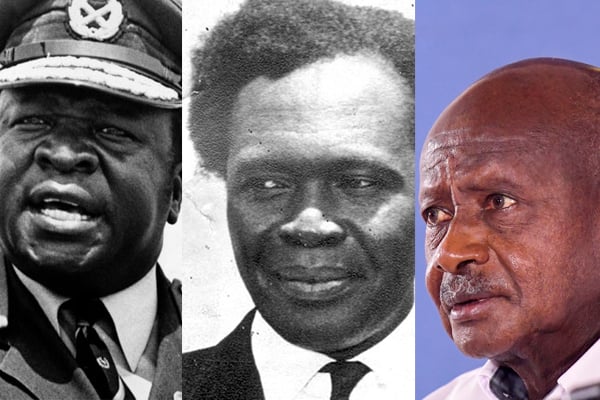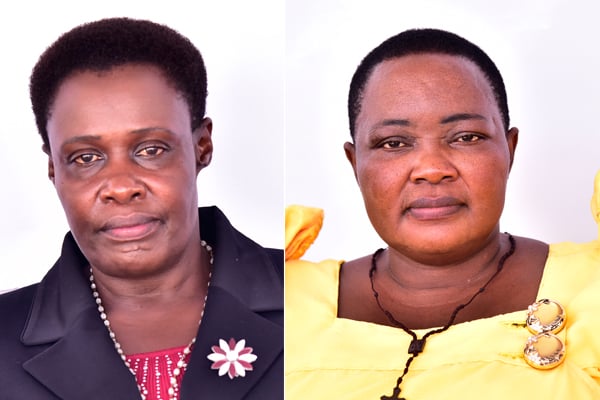Prime
Contrasting Amin, Obote and Museveni Cabinets

A photo montage of (L-R) past Ugandan President Idi Amin, Milton Obote and Museveni, the current head of state. PHOTOS|FILE/COURTESY
What you need to know:
- In appointing his latest Cabinet of ‘fishermen’ last month, President Museveni said he had appointed capable members after personally following and observing them for a long time, allaying fears that most of them may not perform to the expectation of Ugandans. According to the President, the newly appointed Cabinet members are loyal, hardworking and not corrupt.
Recently, President Museveni named a Cabinet of 80 ministers, the biggest in Uganda’s history, as he starts his new term. We look back at Uganda’s previous Cabinets.
Colonial Cabinet
In 1955, the Legislative Council (Legco), the colonial Parliament of Uganda, after a long debate decided that an Executive arm of the central government should be established with Cabinet ministers to help the governor in running the affairs of State.
In August 1955, then Governor of Uganda, Sir Andrew Cohen, appointed a Cabinet of 11 ministers. It was Uganda’s first and smallest. The Cabinet was headed by the chief secretary who served as the prime minister, while the governor served as the president.
The Cabinet, that included three Ugandans and one Indian, had Mr C.H. Hartwell as chief secretary, Mr R.L. Dreschfield as Attorney General, C.G.F.F. Melmoth as minister of Finance, L.M. Boyd as minister of Local Government, A.K. Killick as minister of Natural Resources, G.B. Cartland as minister of Social Services, C. Handley Bird as minister of Commerce and Works, Zakariya C.K. Mungonya as minister of Land Tenure and Minerals, Apollo Kironde as assistant minister of Social Services, Yusuf K. Lule as minister of Rural Development and Amar Maini as minister of Corporation and Regional Communications.
It was this 11-man Cabinet that planned and laid the foundation for social and economic development of Uganda. By 1962, Uganda had the best roads in East and Central Africa. This was documented in the Uganda Argus and London Times newspapers of October 9, 1962.
All concrete bridges over major rivers in Uganda, with the exclusion of the Owen Falls Bridge in Jinja, were a project of the 11-man Cabinet that had no permanent secretaries. All the major roads connecting districts at the time were built by this government in six years.
It was also this Cabinet that secured the loan used to construct Mulago hospital and the Parliament Building, among other projects that included factories in Jinja.
Obote Cabinet
On May 1, 1962, after the April 1962 general election, prime minister-elect Milton Obote assembly a Cabinet of 28 ministers, including parliamentary secretaries that served as assistant ministers. The Cabinet had many experienced ministers.
It included Grace Ibingira, the minister of Justice; Amos Sempa, the minister of Finance; Cuthbert Obwangor, the minister of Regional Administration; John Babiiha, the minister of Animal Industry, Game and Fisheries; Dr E.B.S. Lumu, the minister of Health; Baraki Kirya, the minister of Works; John Rwamafa, the minister of Mineral and Water Resources; Mathias Ngobi, the minister of Agriculture and Cooperatives, and Lawrence Kalule-Settala, the minister of Industry and Communications.
Others included Dr J.S.L. Zake, the minister of Education; Felix Onama, the minister of Internal Affairs; George Magezi, the minister of State; Joash Mayanja-Nkangi, the minister of Commerce; Alexander Ojera, the minister of Community Development; Adeko Nekyon, the minister of Information, Broadcasting and Tourism, and Sam Odaka, the deputy minister for Foreign Affairs. Obote was the minister of Foreign Affairs while Godfrey Binaisa was the Attorney General.
Parliamentary secretaries
They included Shaban Nkutu in the Office of the Prime Minister, Chris Katiti in the Ministry of Regional Administration. K.K.K. Karegyesa in the Ministry of Animal Industry, Game and Fisheries, Joshua Wakholi in the Ministry of Health, S.K. Masembe-Kabali in the Ministry of Works, Lawrence Lubowa in the Ministry of Agriculture and Cooperatives, William Kalema in the Ministry of Education, M.L. Choudhry in the Ministry of Internal Affairs, E.B. Bwambale in the Ministry of Commerce, P. Munyagwa-Nsibirwa in the Ministry of Information, Broadcasting and Tourism and Ms Florence Lubega in the Ministry of Community Development and Labour.
Amin’s 18-man Cabinet
In February 1971, after the army ousted Milton Obote and made Amin president, he assembly an 18-man Cabinet that was experienced.
It has Oboth Ofumbi as minister of State for Defence, Lt Col Ernest Obitre Gama as the minister of Internal Affairs, Wanume Kibedi as minister of Foreign Affairs, E.B. Wakhweya as minister of Finance, Apollo Kironde as minister of Planning and Economic Development, Yokosofati Engur as minister of Culture and Community Development, and J.M.N Zikusoka as minister of Work, Communications and Housing.
Others were Dr J.H. Gesa, the minister of Health; Justus M. Byagagaire, the minister of Labour; Wilson Lutara, the minister of Commerce, Industry and Tourism; William Naburri, the minister of Information and Broadcasting; Erinayo William Oryema, the minister of Mineral and Water Resources; V.A. Ovonji, the minister of Public Service and Local Administration; Abu Mayanja, the minister of Education; P.J. Nkambo, the Attorney General; Prof William Banage, the minister of Animal Industry, Game and Fisheries and F.L. Okware, the minister of Agriculture, Forestry and Cooperatives.
Amin’s first Cabinet was the smallest in post-Independent Uganda.
Museveni’s first Cabinet
President Museveni’s first Cabinet after taking power in 1986 had 40 ministers. Speaking to BBC radio in September 1986 about his large Cabinet, Mr Museveni said his Cabinet was a coalition government intended to accommodation all parties and unite the country.

Some members of the 80-man Cabinet President Museveni named recently attend the reading of the Budget last month.
Dr Samson Kisekka was the prime minister. Eriya Kategaya was minister of State in the Office of the Prime Minister, Daniel Kigozi was minister of Works, Prof Ponsiano Mulema was minister of Finance, Dr Ronald Bata was minister of State for Defence, Dr Crispus Kiyonga was minister of Cooperatives and Marketing, Dr Ruhakana Rugunda was minister of Health, Prof Stanly Tumwine was minister of Industry and Technology, Dr Shema Chemanget was minister of Animal Industry and Fisheries, Ibrahim Mukiibi was minister of Foreign Affairs, and Paul Ssemogerere was minister of Internal Affairs.
Sam Njuba was named minister of Constitutional Affairs, Joseph Mulenga minister of Justice and Attorney General, Amanya Mushega assistant minister of Defence and NRA Chief Political Commissar, Mayanja-Nkangi minister of Education, Dr Alex Ofumbi minister of Youth, Culture and Sports, Dr Kizza Besigye minister of State for Internal Affairs, Jabeli Bidandi-Ssali minister of Labour, and Kirunda-Kivejinja minister for Relief and Social Rehabilitation.
Others included Joseph Okune who was minister of Planning and Economic Development, Abu Mayanja, the minister of Information and Broadcasting, Anthony Butele, the minister of Tourism and Wildlife, Evaristo Nyanzi, the minister of Commerce, Dr David Lwanga, the minister for Environment Protection, Stanislaus Okurut, the minister of Transport and Communications, Chango-Macho, the minister of Water and Mineral Development, Dr Andrew Kayiira, the minister of Energy, Dr Edward Kakonge, the minister of Local Administration and Tom Rubale, the minister without Portfolio, the first under the NRM government.
President Museveni also named James Wapakhabulo the minister of Housing and Urban Development, Robert Kitariko as minister of Agriculture and Forestry, John Sebaana as minister of Regional Cooperation, Balaki Kirya as minister in-charge of Security in the President’s Office, John Ntimba as minister of Education, Ben Okello Luwum as minister of Lands and Surveys, Gertrude Njuba as deputy minister of Relief and Social Rehabilitation, Yafeesi Sabiiti as deputy minister of Energy, Zachary Olum as deputy minister of Housing and Urban Development, Maumbe Mukhwana as deputy minister of Information and Broadcasting, and Robert Ekinu as deputy minister of Finance.
Fishermen Cabinet
In appointing his latest Cabinet of ‘fishermen’ last month, President Museveni said he had appointed capable members after personally following and observing them for a long time, allaying fears that most of them may not perform to the expectation of Ugandans.
According to the President, the newly appointed Cabinet members are loyal, hardworking and not corrupt.
“This is one area where I don’t need assistance. This is a fantastic and pleasant job. I have to look at religion, region, tribe etc... In forming the Cabinet, I was adding, subtracting, dividing... You people are fantastic,” the President said after appointing Ms Jessica Alupo, the former Education minister and retired army Major, as Vice President, and naming former Health State minister for General Duties Robinah Nabbanja Prime Minister.
Don’t want to miss out on any story? For updates on all Daily Monitor stories, follow this link on Telegram: https://t.me/dailymonitor




